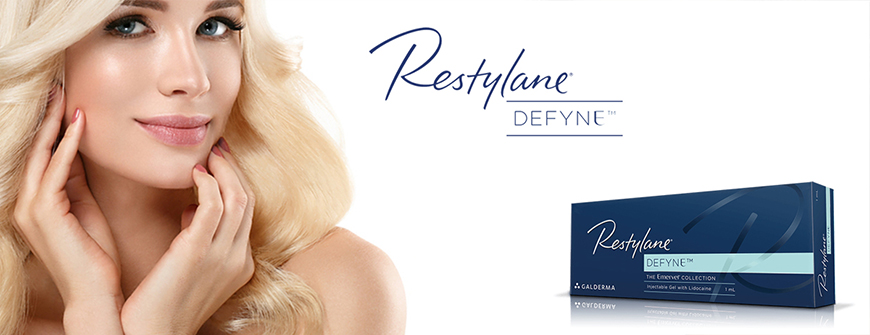

Restylane Defyne
What is Restylane Defyne?
Restylane Defyne is hyaluronic acid filler made with XpresHan Technology.
FDA-approved in December 2016 and released in 2017, it is approved for the correction of deeper
wrinkles of the face such as nasolabial folds (smiles lines), marionette lines and oral commissures.
What are the indications?
Restylane Defyne is indicated for lines that run from the sides of your nose towards the corners of your
mouth (nasolabial folds), the lines that run from the corner of your mouth to the jaw line (marionette lines)
as well as lines on the corner of the mouth (oral commissure). The unique cross-linking of the gel in
Restylane Defyne is also designed to help support your natural expression—for real-life results that help
maintain natural movement when you're smiling, frowning and even puckering up. Restyle Defyne is
different than Restylane Refyne since it is used for deeper folds.
How long will Restylane Defyne last?
Restylane Defyne can last from 6 months to a year but results will
vary from patient to patient.
Is there any discomfort?
Restylane Defyne has an anesthetic in the filler however, Dr. Banki will apply a
topical anesthetic to your face to numb the areas of treatment. Then small needles will be inserted into
the skin to apply the Restylane. You should not accept a lot of discomfort and the procedure does not last
long.
The most common side effects are swelling, redness, pain, bruising, tenderness and lump formation. These are typically mild in severity and typically resolve in less than 7 days in nasolabial folds and less than 14 days in lips. Serious but rare side effects include delayed onset infection, recurrence of herpetic eruptions, and superficial necrosis at the injection site. One risk of using this product is unintentional injection into blood vessel. The chances of this happening are very small, but if this does happen the complications can be serious, and may be permanent. These complications include vision abnormalities, blindness, stroke, or permanent necrosis of the skin. However, these risks are extremely rare on the hands of an expert dermatologist with familiarity of the facial anatomy.




